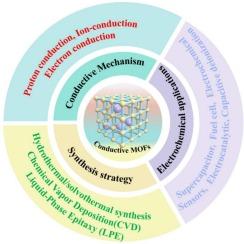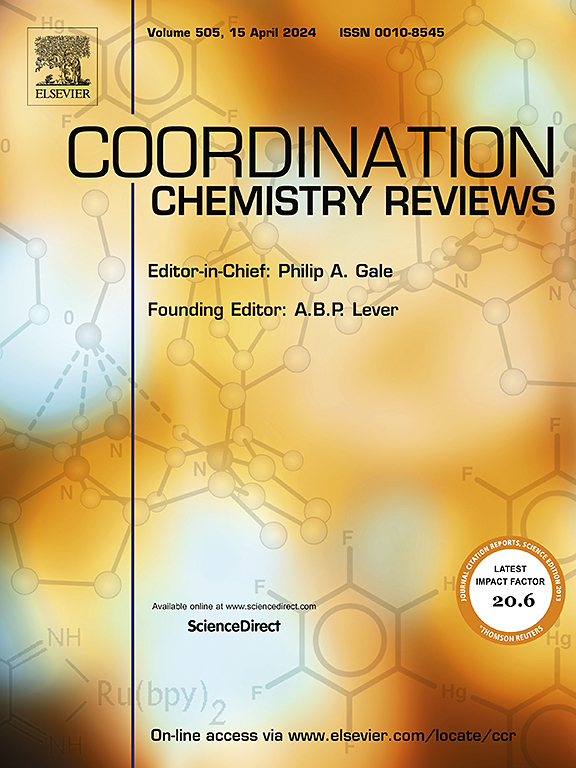具有质子、电子和离子转移的导电MOFs的最新进展及其电化学应用
IF 23.5
1区 化学
Q1 CHEMISTRY, INORGANIC & NUCLEAR
引用次数: 0
摘要
金属有机骨架具有孔隙结构丰富、电荷迁移率高、结构可调等特点,引起了人们的广泛关注,但其电导率低的缺点限制了其电化学应用。本文综述了导电MOFs (C-MOFs)在导电机理、设计策略、合成方法、模型预测和理论计算以及电化学应用等方面的研究进展。深入探讨了C-MOFs中的质子转移、电子转移、离子转移机理及耦合效应。通过对各导电机制的调控策略的探讨,可以解决导电性差的难题,拓展c - mof在电化学领域的应用。了解电化学中的每种导电机制可以确保在特定应用中所需的性能和稳定性。展望了C-MOFs的未来发展趋势,指出了其导电机理研究和电子/电化学应用方面存在的不足和挑战。本文章由计算机程序翻译,如有差异,请以英文原文为准。

Recent development and electrochemical applications of conductive MOFs with proton, electron, and ion transfer
Metal-organic frameworks have attracted considerable interest with the characterization of rich pore structure, high charge mobility, and adjustable structures, but the electrochemical application is limited given the drawbacks of low electrical conductivity. This review summarizes the development of conductive MOFs (C-MOFs), specifically including the efforts to date in the conductive mechanism, design strategies, synthesis methods, model prediction and theoretical calculation and electrochemical applications. The proton transfer, electron transfer, ion transfer mechanisms and the coupling effect in C-MOFs are profoundly explored. By discussing the regulation strategy of each conductive mechanism, the puzzle of poor conductivity can be solved, and the implementation of C-MOFs in the electrochemical field can be extended. Understanding each conductive mechanism in electrochemistry ensures the desired performance and stability in specific applications. Furthermore, future development trends and outlooks are offered, along with challenges to the research gaps and weaknesses in conductive mechanisms research and electronic/electrochemical applications of C-MOFs.
求助全文
通过发布文献求助,成功后即可免费获取论文全文。
去求助
来源期刊

Coordination Chemistry Reviews
化学-无机化学与核化学
CiteScore
34.30
自引率
5.30%
发文量
457
审稿时长
54 days
期刊介绍:
Coordination Chemistry Reviews offers rapid publication of review articles on current and significant topics in coordination chemistry, encompassing organometallic, supramolecular, theoretical, and bioinorganic chemistry. It also covers catalysis, materials chemistry, and metal-organic frameworks from a coordination chemistry perspective. Reviews summarize recent developments or discuss specific techniques, welcoming contributions from both established and emerging researchers.
The journal releases special issues on timely subjects, including those featuring contributions from specific regions or conferences. Occasional full-length book articles are also featured. Additionally, special volumes cover annual reviews of main group chemistry, transition metal group chemistry, and organometallic chemistry. These comprehensive reviews are vital resources for those engaged in coordination chemistry, further establishing Coordination Chemistry Reviews as a hub for insightful surveys in inorganic and physical inorganic chemistry.
 求助内容:
求助内容: 应助结果提醒方式:
应助结果提醒方式:


